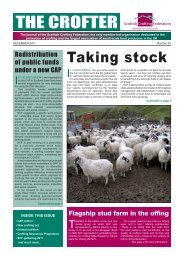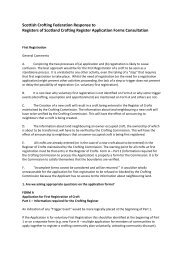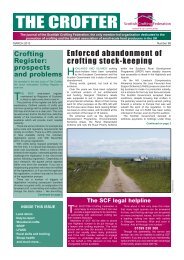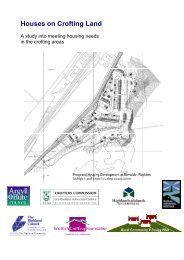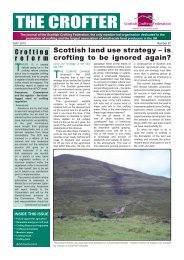Crofter 82 - Scottish Crofting Federation
Crofter 82 - Scottish Crofting Federation
Crofter 82 - Scottish Crofting Federation
Create successful ePaper yourself
Turn your PDF publications into a flip-book with our unique Google optimized e-Paper software.
8<br />
A<br />
n innocent-sounding<br />
name, but it’s also a killer<br />
disease that affects<br />
animals and is fairly widespread<br />
throughout Europe.<br />
To put it in context, the BTV8<br />
strain of this disease has been<br />
identified on 23,959 holdings in<br />
France while the BTV1 strain has<br />
been identified on 4,339 holdings.<br />
There are other strains too. France<br />
has implemented a compulsory<br />
vaccination programme to combat<br />
this.<br />
With the exception of isolated<br />
incidents in England as a result<br />
of irresponsible farmers importing<br />
from France, Great Britain is<br />
accepted to be disease-free.<br />
A compulsory vaccination<br />
programme was agreed by the<br />
industry bluetongue stakeholder<br />
group and the <strong>Scottish</strong><br />
Government in September 2007. It<br />
was considered the most sensible<br />
way to offer adequate protection<br />
against the disease. Scotland has<br />
now become a BTV8 protection<br />
zone.<br />
While Scotland chose this route,<br />
England decided on a voluntary<br />
programme. At a recent meeting<br />
in Edinburgh, chief veterinary<br />
officer Professor Charles Milne<br />
maintained that it would make<br />
perfect sense to have a ‘GB<br />
zone’ where vaccination was<br />
also compulsory in England and<br />
Wales. It is his view that Scotland’s<br />
efforts could be undermined by<br />
England’s decision.<br />
Why then should it be<br />
compulsory in Scotland? The<br />
logic is that by making vaccination<br />
compulsory we will be in a much<br />
better position to give BTV8<br />
immunity to all of our stock and<br />
ANIMAL HEALTH<br />
THE CROFTER, MARCH 2009<br />
Bluetongue – an innocent-sounding name<br />
R<br />
be safe in that knowledge. So far,<br />
there has been a 23.4% uptake<br />
and officials are encouraged by<br />
the response. In sharp contrast,<br />
the uptake in England has been<br />
disappointing, particularly in the<br />
north-west.<br />
Why is it compulsory in the<br />
Western Isles while Shetland has<br />
a voluntary programme?<br />
First of all, Shetland has had a<br />
health scheme in place for many<br />
years funded by the Shetland Isles<br />
Council. It is the assurances given<br />
under this scheme that enabled<br />
Shetland to request a derogation<br />
allowing voluntary vaccination.<br />
Stamper the tup – blue tongue free<br />
We have five ports of entry in<br />
the Western Isles. This would<br />
have to be reduced to no more<br />
than two ports under any proposed<br />
health scheme. It would involve<br />
robust bio-security controls on<br />
all animals entering the Western<br />
Isles. Appropriate bye-laws would<br />
have to be introduced by CNES<br />
who would fund and administer<br />
such a scheme. First of all though,<br />
Research highlights benefits<br />
of on-farm faecal egg counting<br />
esults from new EU-funded research show that,<br />
with the right equipment and guidance, farmers can accurately<br />
carry out faecal egg counts, giving a better understanding of<br />
roundworm problems to target treatment when it is needed.<br />
On average the number of doses administered was reduced by 35%<br />
per year, which resulted in considerable savings on sheep wormer<br />
costs. The reduced reliance on anthelmintics should also help delay<br />
wormer resistance.<br />
Part of the research programme, known as PARASOL (PARAsite<br />
SOLutions), aims to test the practical applications of various targeted<br />
selective treatment initiatives. Desired outcomes are reduced reliance<br />
on wormers with resulting cost savings, reducing the threat of wormer<br />
resistance and improved quality of animal products off the farm.<br />
One part of the project run in the UK by Innovis assessed the impact<br />
of on farm faecal egg counting. Farms in the project were geographically<br />
dispersed in the UK and included a range of farm types from hill to<br />
lowland.<br />
consultation must take place with<br />
all the stakeholder groups and the<br />
majority of crofters would have<br />
to show willingness to sign up to<br />
such a scheme.<br />
Norman Leask from Shetland,<br />
immediate past chairman of the<br />
SCF, has for several years argued<br />
the benefits of the Western Isles,<br />
Shetland Isles and Orkney Isles<br />
having a co-ordinated approach<br />
to animal health and strongly<br />
believes that this is the way<br />
forward. It would certainly make<br />
a difference when negotiating at<br />
Government level.<br />
All animals must be vaccinated<br />
by the end of April. That is the law.<br />
However, at a recent meeting in<br />
Edinburgh, Professor Milne was<br />
sympathetic to a request for more<br />
time in order to vaccinate young<br />
animals in the summer. He gave a<br />
strong hint that the deadline may<br />
be extended till the end of June.<br />
If this is so, then all stockholders<br />
will be notified in due course.<br />
Will animals have to be<br />
vaccinated year after year? It is<br />
hoped that this may only have to<br />
be done for the next two years<br />
but that very much depends on<br />
what is going on in England.<br />
The <strong>Scottish</strong> Government is<br />
subsidising the programme to the<br />
value of £2.6 million which will<br />
greatly help stockholders but it<br />
should be borne in mind that this<br />
is only for the first year.<br />
What do we do now then?<br />
We must vaccinate all animals<br />
before the 30 April deadline as<br />
required, once for sheep and<br />
twice for cattle. I would remind all<br />
stockholders about the penalties<br />
for not doing so.<br />
On inspection, if animals are<br />
found unvaccinated after the<br />
deadline, producers can face a<br />
penalty of a fine up to £5000 and/<br />
or six months imprisonment.<br />
It sounds very draconian and<br />
I venture to suggest that only<br />
an individual with little or no<br />
knowledge of the crofting way of<br />
life could have dreamt up such an<br />
absurd penalty. Try to imagine an<br />
eighty-year-old crofter who forgets<br />
to vaccinate his six sheep being<br />
dragged to court, threatened<br />
with imprisonment and branded<br />
a criminal! The potential danger<br />
is that large numbers of crofters<br />
may decide that it is no longer<br />
viable to keep stock. This would<br />
most certainly, in the long-term,<br />
prove environmentally disastrous<br />
and have other consequences<br />
too.<br />
Vaccine can only be sourced<br />
through the vet and a declaration<br />
must be signed to provide evidence,<br />
on selling, that vaccination<br />
has been carried out. At auction,<br />
the declaration must be submitted<br />
to the auctioneer prior to the sale.<br />
The <strong>Scottish</strong> <strong>Crofting</strong> Foundation<br />
works tirelessly on behalf of<br />
all stockholders and holds regular<br />
meetings with Government ministers<br />
and officials. It is always<br />
advantageous to fight from a position<br />
of strength and it is thanks<br />
to its supportive members that the<br />
SCF can carry out its functions.<br />
Should anyone wish further<br />
information on bluetongue or any<br />
other crofting matter or require<br />
membership please visit the SCF<br />
website at www.crofting.org.<br />
Donnie MacDonald<br />
SCF Area Representative Lewis<br />
Using the FECPAK system developed in New Zealand, participating<br />
farmers showed an average 35 percent reduction in treatments<br />
with anthelmintic wormers with no reported negative effects on the<br />
performance of lambs. In some cases there was an increase in lamb<br />
performance. Farmers reported the system was quick and easy to use<br />
For Northumberland sheep and beef farmer Alan Cowan, it was<br />
the ability to see more clearly what was going on that made the<br />
difference to him. “Although saving on drench costs is a benefit, the<br />
greatest advantage I have seen is that I now have confidence in only<br />
worming when it’s needed and I can hopefully delay the development of<br />
resistance to the levamisole and ML groups on my farm.”<br />
A survey showed that 74% of farmers using the system reduced<br />
their numbers of treatments to lambs. This was achieved by timing<br />
treatment for when the worm burden was shown to be present rather<br />
than guessing or blanket treating.<br />
For more information visit www.fecpak.com




